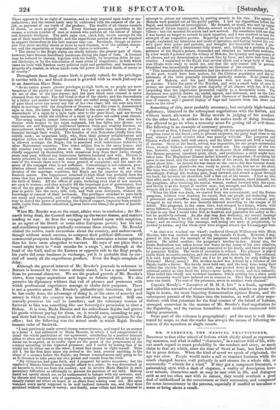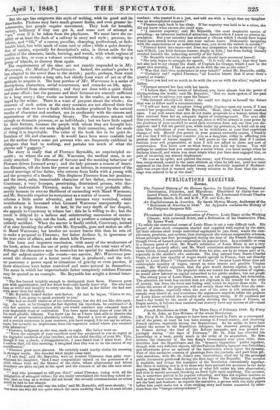MR. WARRENNE, THE MEDICAL PRACTITIONER, BELONGS to that elder school
of fictions which chiefly aimed at represent- ing manners, and what is called "character," in a narrow field of life, with- out much regard to exact probability in the conduct and story, or much claim to that art which, since the time of Scott at least, has been looked for in prose fiction. When the kind of novel we speak of originated, the age was slow. People would make a call or transact business while the coach changed horses, wait patiently in mid stream for a whole tide, or contentedly " whistle for a wind." If they got a competent literature, a painstaking style with a dash of elegance, a reality of description how- ever minute, characters such as may be met with in life, and dialogues such as are too often met with in nature, they would overlook a good deal of unlikelihood in the occurrences or their connexion, and compound for some inconsistency in the persons, especially if needful to introduce a scene or bring about a result. But the age has outgrown this style of writing, with its good and its drawbacks. Fictions may have much grosser faults, and even greater in- coberencies, but people require movement. They look for breadth, variety, brilliancy if they can get it, and some sort of attempt at "art," even if it be taken from the playhouse. We must have the ra-
pidity or at least the dash of a railway in story and style ; persons, in- cidents, and "life," of a coarse, peculiar, changing, professional, or fash- ionable kind, but with mark of some sort or other; while a quiet descrip-
tion of nature, especially for description's sake, is thrust aside for the conflict of the elements, battle, burning, and wreck, with whole regions of prairie on fire, or even a volcano overwhelming a city, or raising up a group of islands, to destroy them again. The requirements of the time are not exactly responded to in Mr. Warrenne, the Medical Practitioner. Indeed, the author's genius is leas adapted to the novel than to the sketch ; partly, perhaps, from want
of strength to sustain a long tale, but chiefly from want of art or of the
aptitude to acquire it. The best portion of Mr. Warrenne is a series of descriptions, characters, social occurrences, and remarks on life, appa-
rently derived from observation; and they are done with a quiet finish and some effect : but the persons and their fortunes are scarcely sufficient for a long story ; they excite no interest in the reader, at least as ma- naged by the writer. There is a want of purpose about the whole ; the elements of such action as the story contains are not allowed their free course ; so that we have a finale which ia neither produced by the natural results of character and conduct, nor in conformity with the canons and expectations of the circulating library. The characters attract well enough as dramatis personae, or as individuals ; but we have little regard for their fortune, because the people with whom they are brought into close conjunction do not seem adapted to their connexion, and the mode of doing it is improbable. The value of the book lies in its quiet de- lineation of life and character. It would have been more readable had not the author drawn some pet persons who are frequently exhibited in dialogues that lead to nothing, and partake too much of what the players call " gaggery." The story is really that of Florence Reynolds, an unprincipled co- quette ; to whom the son of Mr. Warrenne, the medical man, is se- cretly attached. The difference of fortune and the mocking behaviour of Florence drives Leonard away; and the lady pursues a course of heart- less flirtation, till she loses her power as an heiress, in consequence of the
second marriage of her father, who returns from India with a young wife and the prospect of a family. This displaces Florence from her position; and the stern, calm, immoveable character of her father, overawes her. Courtenay, a very brusque, penetrating, determined person, who tho- roughly understands Florence, makes her a not very probable offer, merely because he sees no likelihood of succeeding with Maud Warrenne; and Mr. Reynolds requires its acceptance as a matter of course. Florence reforms a little under adversity, and becomes very wretched, which wretchedness is increased when Leonard Warrenne unexpectedly suc- ceeds to a large fortune. At last, hi the very depth of her despair, she appeals to Courtenay to release her : this he is willing to do; but the result is delayed by a tedious and uninteresting succession of contre-
temps, merely to spin out the book, and to produce a catastrophe by an unlikely accident. When the matter is finally settled, Courtenay, instead of at once breaking the affair with Mr. Reynolds, goes and makes an offer to Maud Warrenne; her brother no sooner learns this than he sets off to make a proposal to Florence; her father declines it, in ignorance of the true state of affairs, and the shock kills Florence.
This lame and impotent conclusion, with many of the weaknesses of the book, arises from the use of petty artifices, and the total want of art. Although the characters may be somewhat too special for modern fiction, and the subject-matter—the events—too narrow, Mr. Warrenne pos- sessed the elements of a better novel than is produced ; and the wri- ter possesses a power equal to situations of gravity or even passion, if those situations were better contrived and more natural in themselves. The scene in which her imperturbable father completely subdues Florence may be quoted as an example. Mr. Reynolds has sought a formal inter- view.
"The fire burned brightly enough to distinguish their faces. Florence grew pale with apprehension, and her heart beat—she hardly knew why. She who had been so wilful and haughty to every one else, felt that in her father she had met with more than her match.
"Mr. Reynolds looked darker and darker. At last he began, Listen to me, Florence; I am going to speak seriously to you.' , "She had no doubt whatever of his seriousness; but she did not like this open- ing. As soon as he thought she had digested his exordium, he continued—' A very few minutes conversation with you would convince any educated man of your deplorable want of cultivation. You have spent many years of your life in the most pitiable idleness. You know (as far as I have been able to observe the
extent of your faculties) absolutely nothing. Beyond a love of gaudy clothes, and a certain assurance in your manners, you have reaped, I do not say no advan- tages, but actually no impressions from the expensive school where you received your education.' "Florence, indignant as she was, made no reply. Her father went on.
" ' Even the example of your excellent aunt has awakened in you no regret at the degraded condition of your intellect, and the sinful frivolity of your life. This,
though it was a shock, a disappointment, I soon found that I must bear. But I confess that, till this morning, I imagined that this was to be the extent of my mortification. "Florence grew more alarmed. He certainly could hardly clothe his meaning in stronger words. She dreaded what might come next. "I now find,' said Mr. Reynolds, with an ironical bitterness that quite over- whelmed his daughter, 'that I may congratulate myself on the possession of a
child whose vices are the themes of the clubs, whose allurements and whose treachery are alike subject to the sport and the censure of all the idle men about town.'
"'And who presumed to tell you this?' asked Florence, rising with all the iMignation of outraged virtue: for she really entertained the boarding-school no- tion that as long as a woman did not break the seventh commandment no crime could be laid to her charge. " 'Itlittle matters who was the teller,' said Mr. Reynolds, still more sternly; it was some one who did not quite attach the same meaning that I do to such odious conduct; who treated it as a jest, and told me with a laugh that my daughter was an accomplished coquette!' "Florence sank back in her chair. If her coquetry was held to be a crime, she did not know what excuse she could urge. "'I consider coquetry,' said Mr. Reynolds, 'the most despicable species of swindling; an infamous method of attraction, beyond which I know no greater de- gradation. But your notoriety has attained a climax which I should have hoped would have struck horror even into your callous heart. Dishonestly tampering with the expectations of an unfortunate man, you drove the wretch to suicide!' "Florence burst into tears—not from any compassion to the memory of Cap- tain O'Neill, [an Irish fortune-hunter, deeply in debt,] but from feeling literally crushed beneath the unbending severity of her father.
"Mr. Reynolds waited in silence until she should have recovered herself.
"She soonbegan to struggle for speech. ' It is well,' she said, that they have not also laid to my charge the death of Captain Le Grange, which I saw in the paper this morning. I had as much to do with the one as the other l' " Was that duel then undertaken in year behalf?' asked Mr. Reynolds, coldly. " Certainly not!' replied Florence; all London knows that it arose from a quarrel at starts.' " Then you had not as much to do with the one as with the other,' replied her father.
"Florence covered her face with her hands.
" I believe that, from habits of falsehood, you have almost lost the power of distinguishing the truth,' said Mr. Reynolds. But we have spoken of the past —I have now to address you upon the future.' "She listened silently—in terror: she could not depict to herself the future that was to follow such a commencement.
"‘ I will not have my daughter bring public disgrace upon my name, if I can control her propensities,' said Mr. Reynolds. ' Hear, then, what I have resolved upon. I am well aware that men do not make proposals to a woman unless they have received from her an adequate degree of encouragement. The next offer that you receive, 1 command you to accept, since it will be always in your power by the prudence of your conduct to avoid such overtures from any one that you dis- approve: and I will not permit you, while under my protection, to hold out to any man false indications of your favour, to be withdrawn at your first capricious change of will. Should you persist in your present unworthy course, I frankly tell you that I will no longer consider you as a daughter, either in affording you present shelter or future support. I will prove to the world that if I cannot restrain your evil propensities, at least I will not afford to them any sort of countenance. You know now on what terms you hold my favour. You will perhaps be cautions how you encourage a suitor whom you must accept when he declares himself, and whom you must retain when you have once engaged him, on pain of incurring my utmost displeasure.'
He rose as he spoke, and quitted the room; and Florence remained motion- less, overpowered, seated in the same attitude as when he left her, until her maid
t at the door of the darkened room, and discreetly inquired if Mademoi- isepl feeti;:sd aware that it wanted only twenty minutes to the hour that the car- riage was ordered to be at the door.'



























 Previous page
Previous page